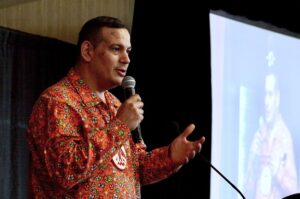Action and positive change: the pathway forward to address Indigenous racism in health sector

By Rick Garrick
THUNDER BAY — Serpent River’s Isaac Murdoch stressed the importance of focusing on action and positive change during his March 18 presentation at St. Joseph’s Care Group’s Regional Indigenous Knowledge Gathering Event: Walking Together with Humility. The gathering, held March 18-19 at the Victoria Inn in Thunder Bay, was hosted by N’doo’owe Binesi, the Indigenous Health division at St. Joseph’s Care Group, to explore pathways forward to address Indigenous racism in the health sector.
“One time, I was asked to facilitate a session with 30 principals and 30 six-year-olds — so I quickly divided the two groups up to form a chief and council each and they had to figure out how to get clean water to baby birds,” Murdoch says. “The adults came up with policy prescriptions, they came up with creating a new political party, they came up with a whole bunch of ideas and thoughts regarding legal frameworks and different things like that to try to accommodate environmental issues.”
Murdoch says the young people did something very different from the adults, they filled a clay pot full of water.
“And they said: ‘Let’s just go give it to them,’ and they actually brought the clay pot outside in the back where the ravine was and sure enough, birds started drinking out of that clay pot right away,” Murdoch says. “So it just goes to show that when we take action and use our hearts instead of our minds, we can make real positive change.”
Murdoch says the young people were not confined to the room, policy reform, or rules.
“They were free, because they’re six,” Murdoch says. “They didn’t have the decades of conditioning and colonization and the decades of conforming. They were free like those birds. I’ll never forget that day when little six-year-old kids taught me, let it go, take action, make beautiful, do something incredible, do something from the heart.”
Murdoch says he embarked on a second wave of healing after witnessing the young people’s focus on taking action and creating positive change.
“I thought if I need to be a better person, then I better go do it,” Murdoch says. “If I need to be able to make decisions like that, I need to be healed, I can’t let trauma always get in the way of what I do.”
Fort William Chief Michele Solomon says Murdoch’s presentation was “so impactful.”
“When I think about our communities and the impacts that colonization has had, it’s so easy for us to get focused on the negative and the things that are wrong,” Solomon says. “His message was so beautiful and so clear in that we’re often focusing on the wrong things and if we do that work of building on the things that are good that our communities I think will be better for that.”
Solomon also appreciated the opportunity to hear from keynote speakers Anthony Johnson and Dr. James Makokis, the first two-spirit couple to win on Amazing Race Canada.
“They came with such impactful and powerful messages too about Indigenous ways of knowing and our own medicine that we carry and how that helped us for all the years before contact,” Solomon says. “So there were really beautiful stories that they brought with them and beautiful teachings that I hope everybody is able to take something from what was shared today.”
Paul Francis Jr., vice president at N’doo’owe Binesi, St. Joseph’s Care Group and Wiikwemkoong citizen, says the approach his team has taken is to ground their work in their culture, ceremonies, and Elders, so hearing Murdoch’s message made him feel good that they were on the right track.
“For example, we have a racism and discrimination policy, so in that policy and procedure there is an option to resolve it through sharing circles, use of Elders, so we’re incorporating our ways in even to deal with some of the hard stuff,” Francis says. “It exposes the non-[Indigenous] people to our culture and our ways, and we do get really good feedback that these things work and they help, so I think that was a really positive message to focus on the good and building. Our culture is so beautiful, our teachings, our knowledge, so that’s what we try to ground ourselves in through this work.”
Janine Black, president and CEO at St. Joseph’s Care Group, also acknowledged the pain and suffering that has occurred to Indigenous people in healthcare during the gathering.
“And I also want to acknowledge that it has not ended suddenly, I think we are constantly improving but I still see racism on a regular basis in our own organization,” Black says. “I want to acknowledge that, not just for people we serve but also the people walking into our buildings as visitors, as family, and also our staff, so I apologize for that and I do want to do better. I’ve been learning, not when I was in school, I’m too old for that, but I’ve been learning since then in my work life about Indigenous culture, about the harms that were done, and most recently, I’ve learned especially from our Elders Council.”


